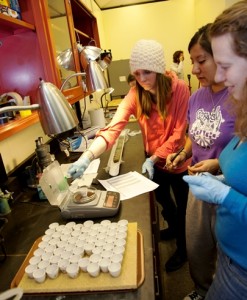I teach or co-teach the following courses at Dartmouth:
EARS 1 – How the Earth Works (Fall and Spring); Co-taught with Ed Meyer or Sarah Slotznick
This course introduces the principles of physical geology by describing the Earth’s components and analyzing the processes that control its evolution. Mountain ranges and deep sea trenches, volcanism and earthquakes, surficial and deep-seated geologic processes provide the evidence we will use to interpret the Earth’s makeup and history. Earth resources, geologic hazards, and environmental protection will be discussed in connection with a variety of general geologic topics.
Photos below show the EARS 1 lab and field trip to Quechee Gorge, VT.
EARS 15 – Earth’s Climate – Past, Present, and Future (Winter)
Understanding what drives climate change is one of the major scientific questions of the 21st century. Evidence for past (paleo) climate change provides essential information about Earth’s climate system and the potential for future change. In this course, we will investigate paleoclimate changes and the chemistry and physics of the modern climate system. We will explore the mechanisms that influence climate on various time scales and the projections for future change. Laboratory projects will focus on collecting and analyzing data from local sites to develop paleoclimate records.
Photos below are from EARS 15 field and lab work collecting and analyzing sediment cores from local ponds. Also see this video about class research on Occom Pond: https://www.youtube.com/watch?v=-TxGQ1Yt5Z4
EARS 45, 46, 47 – “The Stretch” Earth Science Off-Campus Program – Eastern Sierra segment on surficial and glacial geology (Fall); Co-taught
The Department of Earth Sciences field study program (EARS 45, 46, and 47), traditionally called the “Stretch,” is a world-class opportunity for Dartmouth undergraduates to gain experience in traditional and emerging field techniques in the Earth Sciences, to learn about the spectacular bedrock and surficial geology of the western United States and Canada, and to travel, work, and live closely with fellow students and Dartmouth faculty and graduate students.
The format typically includes seven serial segments which, in recent years, have consisted of a glaciology project in the Canadian Rockies, tours of many of the national parks of the western United States, three- to four-day focused field-based exercises in Wyoming, Montana, California, and Arizona, geophysical studies of Death Valley, California, and a culminating hike into the Grand Canyon, Arizona. Along the way, students are exposed to a wide range of ongoing research projects conducted by Earth Sciences faculty, graduate students, and senior thesis students, in addition to a number of alumni and research scientists
More information about the Stretch is here: https://guarini.dartmouth.edu/programs/earth-sciences-fsp-stretch.
EARS 75/175 – Quaternary Paleoclimatology (Winter or Spring)
Evidence for past (paleo) climate change provides essential information about Earth’s climate system and the potential for future change. This course focuses on understanding paleoclimate changes during the Quaternary Period such as glacial-interglacial variability, rapid climate changes, and the recent “stable” climate conditions of the Holocene epoch. We will rely on published scientific data to examine these various topics and critically evaluate hypotheses for mechanisms of climate change.
EARS 201 – Fundamentals and Pedagogy in Earth Sciences (Fall); Co-taught
This course aims to develop some of the fundamental concepts and skills of geology as well as to provide teaching experience. We will use the rich geological history of New England as our training ground for learning and reviewing geologic concepts and practicing field skills. In order to provide ample background, we will read classic texts and recent, cutting-edge papers on the geology of New England. We will also conduct local and regional field trips to investigate exposures and hone field skills. In preparation for graduate teaching responsibilities, as well as for further careers in teaching, we will learn about and discuss pedagogy. Students will develop and present an introductory-level earth sciences lecture and provide critiques of other students’ presentations. Finally, this course will help focus students’ graduate research projects through class discussions and final presentations. Not open to undergraduates.
EARS 203 – Scientific Writing (Spring); Co-taught
A part of the core curriculum required of all graduate students. Communication is fundamental to professional preparation in the Earth Sciences. This course will focus on communicating science in written form, primarily through the writing of a research proposal. In proposal writing, students will gain extensive scientific writing and editing experience by writing a research proposal on the topic of their graduate research. Faculty and students together will provide feedback on the proposal with the goal of improving overall scientific writing skills. Not open to undergraduates.







